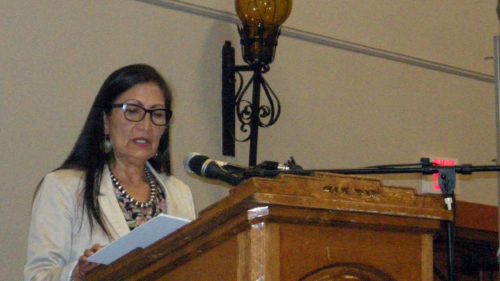SANTA FE — Budget analysts should reconsider proposals to divert money from the New Mexico Game Protection Fund, members of the legislative committee agreed on Monday after hearing opposition from representatives of the New Mexico Wildlife Federation and other conservation groups.
Gov. Michelle Lujan-Grisham’s proposed budget calls for transferring $500,000 from the state Game Protection Fund to state parks “to support hunting, fishing and trapping activities and wildlife conservation measures on state park properties.”
Another proposal calls for transferring over $100,000 from the Game Protection Fund to the Office of the State Engineer to help cover the cost of dam operations.
A subcommittee of the House Appropriations and Finance Committee on Monday voted to advance portions of the governor’s budget proposal to the full committee for consideration, including the two proposed transfers from the Game Protection Fund.
However, the subcommittee directed legislative and executive budget analysts to meet with representatives of Game and Fish and other agencies to consider possible alternatives to the proposed fund transfers before the measure gets to the full committee in coming weeks.
The game department receives no state general funds, drawing the bulk of its revenues from license sales and federal funds.
Similar efforts in past legislative sessions to transfer money from the Game Protection Fund to state parks have been defeated in the face of warnings from the New Mexico Wildlife Federation that such transfers would violate federal law and subject the game department to stiff penalties.
Jesse Deubel, executive director of the New Mexico Wildlife Federation, testified to the subcommittee on Monday against the proposed transfers. He noted the federation was instrumental in the creation of the Game Protection Fund decades ago and has defended it ever since.
Transferring money from the Game Protection Fund to state parks would essentially make any hunter or angler who visits state parks pay twice, Deubel said.
John Crenshaw, president of the board of the New Mexico Wildlife Federation, testified that all 34 state parks are closed to trapping, 24 are closed to hunting and only 14 allow fishing. He said the collective contribution of state parks to hunting, fishing and trapping in the state is nominal.
However, Crenshaw warned that the consequences to the New Mexico Department of Game and Fish of taking money from the Game Protection Fund would be disastrous.
“The thought of losing that federal aid money, which is about a third of their budget’ just gives me a cold sweat,” Crenshaw said.
Dan Roper, public lands coordinator for the New Mexico Chapter of Trout Unlimited, testified that the game department already has helped to fund some activities at state parks, including construction of boat ramps on the San Juan River.
But considering the potential to lose federal funds, Roper said taking money for state parks from the Game Protection Fund shouldn’t be in the state budget.
Joel Gay, a board member with the New Mexico chapter of Backcountry Hunters & Anglers, said, “Even though we support parks, and safe dams and all that, those projects need to be funded directly,” he said.
Rep. Christine Trujillo, D-Albuquerque, served as chairman of the committee meeting. After hearing from the conservation groups, she said the issue demanded more conversation before the committee could act on it.
Anne Hanika-Ortiz, a contract analyst with the Legislative Finance Committee, responded that staffers with her office and the state’s Department of Finance and Administration would be willing to rework the transfer language to make it more palatable.
The committee ultimately accepted a recommendation from Rep. Randal S. Crowder, R-Clovis.
Crowder called for advancing the game and fish budget proposal, including the fund transfers from the Game Protection Fund, to the full committee. In the meantime, Crowder stated that staffers with the Legislative Finance Committee, the state Department of Finance and Administration as well as the affected agencies should “work out all these issues, and come to the full committee with a solution.”



